Edmond Hall
| Edmond Hall | |
|---|---|
 | |
| Background information | |
| Birth name | Edmond Hall |
| Born |
May 15, 1901 Reserve, Louisiana, US |
| Died |
February 11, 1967 (aged 65) Boston, Massachusetts |
| Genres |
Swing New Orleans Jazz |
| Occupation(s) | Clarinetist |
| Instruments | Clarinet, Alto saxophone, Baritone saxophone |
| Associated acts | Buddy Petit, Claude Hopkins, Billy Hicks, Henry "Red" Allen, Teddy Wilson, Louis Armstrong |
Edmond Hall (May 15, 1901 – February 11, 1967) was an American jazz clarinetist and bandleader.
Over his long career Hall worked extensively with many top performers as both a sideman and bandleader and is perhaps best known for the 1941 chamber jazz song "Profoundly Blue," which is regarded as a pre-World War II jazz classic.
Biography
Early life
Born in Reserve, Louisiana, about 40 miles west of New Orleans on the Mississippi River, Hall and his siblings were born into a musical family. His father, Edward Blainey Hall, and mother, Caroline Duhe, had eight children, Priscilla (1893), Moretta (1895), Viola (1897), Robert (1899), Edmond (1901), Clarence (1903), Edward (1905) and Herbert (1907).
His father, Edward, played the clarinet in the Onward Brass Band, joined by Edmond's maternal uncles, Jules Duhe on trombone, Lawrence Duhe on clarinet, and Edmond Duhe on guitar. The Hall brothers, Robert, Edmond, and Herbert, all became clarinetists, but Edmond was first taught guitar by his uncle Edmond. When Hall finally picked up the clarinet, "he could play it within a week. He started Monday and played it Saturday," his brother Herb recalled in an interview with Manfred Selchow who wrote an extensive Edmond Hall biography (A Bio-Discographical Scrapbook on Edmond Hall), Profoundly Blue in 1988.
Hall worked as a farm-hand, but by 1919 he had become tired of the hard work, and despite his parents' worries of finding a decent job as a musician, he left for New Orleans. The first New Orleans band he played with was that of Bud Rousell (Bud Russell). He also played with Jack Carey (trombone) and blues cornetist Chris Kelley.
Begins career in music
Hall's first big break came in late 1920, when he went to a dance at Economy Hall. The legendary Buddy Petit was playing. "When I got inside, it was a revelation", Hall said. Petit's clarinet player had left the band just a few days later, and the following Saturday Ed Hall was sitting in with Petit's band as a replacement. In 1922 Ed Hall left Petit.

Arriving in Pensacola, Florida, he joined Lee Collins' band. In 1923 he joined Mack Thomas' band; from there he went on to play with the Pensacola Jazzers, where Hall met the young trumpeter Charles Williams, better known as Cootie Williams. From there he went on to play with "Eagle Eye" Shields. Together with Cootie Williams, he left Shields and joined Alonzo Ross' band, the Alonzo Ross DeLuxe Syncopators, in early 1927. In 1928 the band's pianist Arthur "Happy" Ford formed a new group and immediately hired Hall and Williams.
In New York
In 1929 Hall went back to New York, where he joined Charlie Skeet's band, but soon changed yet again to play with Claude Hopkins. Under the leadership of Hopkins, the band became enormously popular and in 1930 they got an offer to play at the Savoy Ballroom, "The World's finest Ballroom," a big step for Hall. In late 1935 due to personal problems with the band leader, Hall left the Hopkins Band.
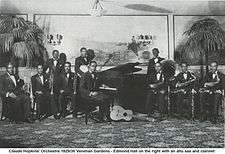
In 1936 he joined Billy Hicks' band, the Sizzling Six. Hall, who had been featured mainly on alto and baritone saxophone since 1922, finally had a place as a full-time clarinetist. Meanwhile, his new sound on the clarinet had made a full circle and he began recording with the "big stars." On June 15, 1937, in New York, he had his first recording session with Billie Holiday. Among the band members was Lester Young on tenor saxophone.
Hall stayed with Hicks' band until early 1939, when he left and stepped into Café Society, joining Joe Sullivan's band in late 1937. While playing with Sullivan Hall had many recording dates with different bands and musicians in between the regular job at the Cafe Society with Sullivan.
Barney Josephson, the owner of Cafe Society Downtown and Cafe Society Uptown, was very fond of Hall's playing, and after Sullivan left to play solo piano at Nick's, Hall became the house clarinetist. Any band that would come in to play had to get rid of their clarinetist and take Hall, or they would not get the job, according to Josephson. In 1940 Henry "Red" Allen came to play at the Cafe Society, and Hall became the band's clarinetist. Hall spent 9 years at the Cafe Society, playing and recording in between jobs with many of his contemporaries, such as Bud Freeman, Teddy Wilson, Charlie Christian, Henry "Red" Allen, J.C. Higginbotham, Art Tatum, Big Joe Turner, Hot Lips Page, Zutty Singleton, Meade Lux Lewis, Big Sid Catlett, Josh White, Ida Cox, Coleman Hawkins, Helen Ward, Vic Dickenson, Sidney de Paris, Wild Bill Davison, Eddie Heywood, Roy Eldridge and Jack Teagarden. Wednesday, February 5, 1941, was a special day in Hall's career, when he was the nominal leader of a recording session for the first time.
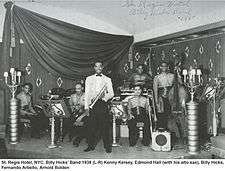

Hall joins Teddy Wilson
Late in 1941 Hall left Allen to join Teddy Wilson, who also played at the Café Society. Around this time Hall's style changed. His admiration for Benny Goodman and Artie Shaw caused him to work on his technique. Hall tried the Boehm System Clarinet, but that attempt was short-lived. He soon went back to his beloved Albert System clarinet, which he would play until his death.
During this period, he made many recordings as Edmond Hall's Blue Note Jazzmen, the Edmond Hall Sextet, the Edmond Hall Celeste Quartet, Edmond Hall's Star Quintet, Ed Hall and the Big City Jazzmen, and Edmond Hall's Swingtet. The recording sessions always took place in between the work hours of the Café Society and included many of the musicians who performed there.
Hall became very popular among the musicians and critics and was frequently invited to the New York Town Hall Concerts led by Eddie Condon.
Hall becomes a leader
In 1944 Teddy Wilson left and abandoned his popular and successful sextet to form a trio (according to Wilson). Not wanting to give up their spot Hall and the other Wilson band members stayed at the Café Society. Owner Barney Josephson asked Hall to front a band of his own. At 43 and after more than 25 years in the music business, he became a band leader in July 1944. Hall's sextet became a draw at the Café Society. More recording dates followed for the famous Commodore Records and Blue Note labels.
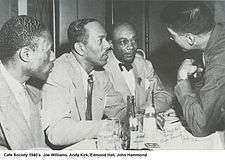
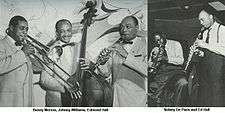
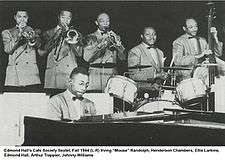
While business at the Café Society was exceedingly good, Hall appeared at Town Hall Concerts in between. Hall relocated with his band to the Café Society Uptown, where he was equally successful. The Hall band would also play for World War II servicemen. Live broadcasts of those sessions exist but have not yet been released on record.
In the 1945 Esquire magazine poll Hall was voted the second-best clarinet player, just behind the clarinetist he admired most, Benny Goodman.
In 1946 his band played twice weekly on WHN's Gloom Dodger radio show.
With Louis Armstrong at Carnegie Hall
Early in 1947 Louis Armstrong's appearance at Carnegie Hall was announced. Hall and his small combo were picked to accompany Armstrong during half of the program. The other half featured Armstrong and his big band. As a result of this concert, Armstrong would abandon his big band and switch a small combo, the All Stars. Hall become a member of the All Stars in 1955.
As bop became the dominant style of jazz in the mid-1940s, Josephson sought new musicians to play Café Society. In June 1947 Hall left the club.
In September 1947 Hall joined the All Star Stompers with Wild Bill Davison, Ralph Sutton and Baby Dodds. Meanwhile, Barney Josephson again asked Hall to return to Uptown Café Society with a new band. Business worsened, however, and Josephson closed Uptown for good in December 1947.
Besides the Carnegie Hall recording with Armstrong, the studio recordings from September–December 1947 (mainly with Punch Miller and his band) were Hall's last until 1950. After Uptown was closed, Hall took his men back to Downtown Café Society, but in June 1948 Hall's band was replaced with the Dave Martin Trio.
In the fall of 1948 Hall took a job at Boston's Savoy Cafe, playing with the members of Bob Wilber's band who had gone to tour Europe. During this time Hall accepted jobs outside of Boston and together with pianist George Wein promoted a concert they held on a day off. Steve Connolly of the Savoy Cafe asked Hall to bring his own band and replace Bob Wilber. Hall's band, the "Edmond Hall All Stars" began playing the Savoy on April 4, 1949. The band was hailed as "The best band Boston ever had".
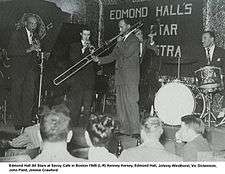
Hall left the Savoy in early March 1950 to get back to New York. He played clubs and festivals, including one job in San Francisco. On August 3, 1950 Eddie Condon called Hall in San Francisco, asking him to join his band at Eddie Condon's club.
Hall stayed with Condon, playing other jobs as well, mostly with members from Condon's band. An example was the Annual Steamboat Ball in June 1951 and the frequent sessions for the Dr.Jazz" broadcasts during 1952. Condon's band was popular at the club and recorded many sessions during Hall's engagement.
In November 1952 Hall participated in a special concert, "Hot Versus Cool," which pitted New Orleans-style jazz against bop. The New Orleans-style musicians were: Jimmy McPartland, Vic Dickenson, Hall, Dick Cary, Jack Lesberg and George Wettling. On the opposite side there was Dizzy Gillespie, Max Roach, Al McKibbon, Ray Abrams, and Don Elliott. The record received a top rating of 5 stars in Down Beat. During 1954 Hall would play with many other musicians, such as Vic Dickenson, Ralph Sutton, Mel Powell, Jack Teagarden and Jimmy McPartland, and produce recordings for labels like Storyville, Decca and Columbia.
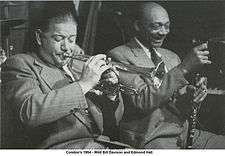

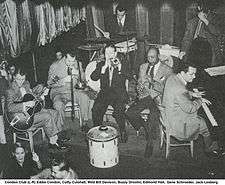
Hall joins the All Stars
At the end of 1955 Hall left Condon to appear as a guest musician on the Teddy Wilson show. From there he went on to meet with Louis Armstrong, to replace Barney Bigard. Joining Armstrong would prove to be one of the highlights in Hall's career. The Band left October 1955 for Europe, starting their 3-month tour in Sweden. A very successful tour for the All Stars.


The Band sold out every show in every country during their three months Europe tour, giving an extra matinee in Stockholm, Sweden in order to accommodate fans who could not get in to see the first show. Back in the US the band's success was praised, as Felix Blair of the New York Times wrote: "America's secret weapon is a blue note in a minor key. Right now its most effective ambassador is Louis Satchmo Armstrong." Creating the title for the "Ambassador Satch" album, which was released under Columbia. In February 1956 the combo made Los Angeles, California their home, to shoot the motion picture High Society starring Grace Kelly and Bing Crosby.
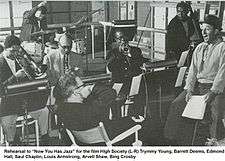
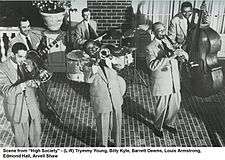
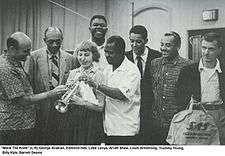
After a few concerts in the US the band had another engagement in Australia which again was a big success. The Australian "Quarterly Rag", Vol.1, No.4 July 1956 devoted an extended article to Hall. Another article from "Music Maker" (Sidney) May 1956 had this to say: "... as a soloist Hall was outstanding, he brought the house down with his slow, quiet "You Made Me Love You" and the encore "Sweet Georgia Brown" had the crowd yelling for more." The next concert overseas in Great Britain (May 1956) did not do as well, due to bad acoustics in the Empress Hall. However as before Hall was praised again in 3 articles (The Observer, Manchester Guardian and Jazz Journal) of his exceptional playing and named the only one who came through despite the bad acoustics. Directly from England The All Stars flew straight to Ghana, Africa for a first appearance. They were greeted at the airport by 13 bands, welcoming them with ALL FOR YOU, LOUIS (on Columbia CL 1077). Playing in front of 5000 people crowds in Europe before, this was the largest crowd Armstrong and his men had played for. 110000 people awaited them for their first concert.
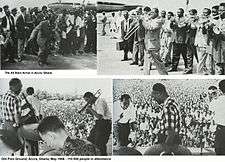
July 14, 1956, the band played with the New York Philharmonic under Leonard Bernstein. The evening's grand finale was Bernstein conducting the stadium symphony orchestra in an Alfredo Antonini arrangement of "Saint Louis Blues" a nearly 12 minute rendition, changing between the All Stars and the orchestra. The event was held at Lewisohn Stadium in New York, which drew a crowd of 21000 people.

The event was partially filmed, as part of a documentary called Satchmo The Great. It was produced and narrated by Edward R. Murrow and contains many clips of the All Stars with Hall, while in Europe and Ghana.
The next day The All Stars appeared on The Ed Sullivan Show, before leaving for the midwest to play the Ravina Festival at Highland Park with a crowd of 136816 people in attendance. The next concert was on August 1956, joining other famous musicians to play the Norman Granz Benefit at Hollywood Bowl. The concert hit a box office high of $32000. More tight scheduled concerts and one-nighters throughout the US followed. December 8, 1956 The All Stars entered Decca studios to record the album "Satchmo - A MUSICAL AUTOBIOGRAPHY".
February 6, 1957 The All Stars kicked off another grueling tour with 60 stops throughout the US. While playing at a concert in Knoxville Tennessee ( February 26, 1957) someone threw a stick of dynamite over a fence, which exploded a few hundred yards away from the municipal building where the band played. Armstrong calmed the crowd by saying: "That's all right folks, it's just the phone." and the show went on.
October 27, 1957 The All Stars took off for South America, where they again were greeted by a large crowd of fans at the airport. Hall became a favorite of the fans and was invited to a recording session with a local band and became an honorary member of the "Hot Club De Buenos Aires."
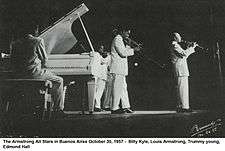
More touring, one-nighters and another highlight the invitation to play at the Boston State house, where Armstrong was officially named the "Ambassador of good will."

Ed Hall leaves the All Stars
Around June 25, 1958, Hall parted with the All Stars. He had grown tired of playing the same song set at each venue and of the stressful schedule Armstrong kept.
After leaving the All Stars he and his wife Winnie flew to California for a long vacation. During his vacation he practiced a lot, "trying to get Louis out of his system." After his vacation he met up with old friends, Ralph Sutton, Eddie Condon and Teddy Wilson, with whom he played August or September 1958 at the "Embers" in New York. More engagements followed with old friends like Henry "Red" Allen, and J.C. Higginbotham. Still highly regarded, Hall was asked to play in Canada as guest star, to play with two local bands, in Cairo and Toronto. The reviews of the concerts were full of praise calling Hall one of the Giants of Jazz. Back in Chicago he'd play a six-week engagement at the "Jazz, Ltd." Announced as "The Great and Incomparable Louis Armstrong Clarinetist."
After Chicago, in December 1958 Hall went back to the recording studio and recorded "Petit Fleur" with his own Sextet, including old friends from the cafe society as well as trombonist Vic Dickenson. More recordings followed one album even with strings.
Hall goes back to Ghana
Having been impressed with the beauty, climate, friendly people and atmosphere, Hall decided to go back to Ghana, a place bare of racial discrimination, which Hall had been victim to in his own country many times. His goal was to settle there and open a music school. On March 7, 1959, Ed and his wife Winnie left New York for an "exploratory trip". Returning to the US on March 27, 1959, they had decided to settle in Ghana for good, coming fall.
Back in the US, Hall was invited to participate at the "South Sore Jazz Festival" in Milton, Massachusetts. He would play all the annual festivals until his death. On June 25 and 26 1959, Ed Hall went back to the recording studio to record "Rumpus on Rampart Street" under Hall and his orchestra.
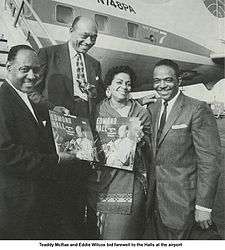
October 1959 the Halls departed for Ghana. The Stay was short lived. What started enthusiastically ended up in disappointment. Hall was not able to get students to practice, their lack of discipline and quickly fading interest was reason for the project's failure. On December 17, 1959, the Halls arrived in England to spend the holidays with friends.
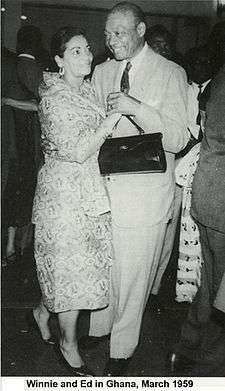
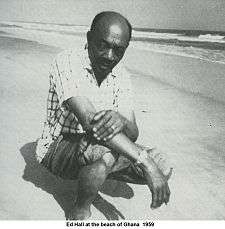
December 27, 1959 back in New York the Halls had to reorganize. The immigration to Ghana had cost Hall a spot at the big Germany tour he was supposed to be part of, led by Humphrey Lyttelton in January 1960. Playing weekend jobs and occasionally at Condon's, Hall went back to Toronto, Canada on February 15–20, 1960. The 2nd "Annual South Shore Jazz Festival" was on April 7, 1960, where he headlined the show.
May 28, 1960 Ed Hall was invited by the Czech government, to be featured as a guest star in Gustav Brom's band, to tour Hungary and Czechoslovakia. The three-month engagement was a success, with up to 15000 people in attendance and fans rushing backstage, demanding autographs. His spirits high again the "wounds" of Ghana healed.
Back in the US Hall laid off for a while but never declined to play at "Central Plaza", when invited. There he met Chris Barber, trombonist from England. A few days later Barber invited Hall to play and record a session with him and his band on November 7–8, 1960.
In Denmark and Germany
Hall starts 1961 with a trip to Denmark, flying to Copenhagen on February 27, 1961. He joins "Papa Bue's Viking Jazz Band" as guest star. Hall and Papa Bue's band left to tour Germany for 5/6 days, playing at the Sportpalast in Berlin. On March 15, 1961 Hall arrived in Stuttgart for a radio broadcast - recording session. On March 16/17 1961 Hall went back to Denmark, playing with a group of young musicians, the "Cardinals" and other bands until his return to the US in early April.
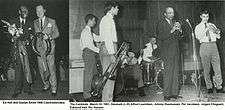
After assembling a new band the "Hall-American-Jazz-Stars" he opened at the new "Condon's" in New York, where many prominent musicians and movie actors came to listen to Hall. Originally the engagement was for four weeks but due the band's success it went well into the summer of 1961.
Hall was supposed to join Papa Bue's Band to tour Germany, he even had signed the contract and despite knowing about his popularity in Germany, Hall ended up touring with Yves Montand through Canada and the US. Most likely that Montand offered Hall a salary he simply could not refuse. The tour lasted 5 months. During the tour Hall had time to participate in another recording session (February 1962), joining Leonard Gaskin's All Stars. After the tour he went back to record yet another session with the Marlowe Morris Quintet, before picking up at Condon's again. April 1961 Hall plays at the 'Fourth Annual Milton Jazz Concert" together with Doc Cheatham. Still at Condon's he left to play in Toronto. Where P.Scott of the Globe and mail wrote "He (Edmond Hall) will be 61 years old in two weeks and he is the most dynamic performer in Jazz today." - P. Scott in Globe and Mail 05/05/1962.
Back at Condon's Hall was invited to a recording session with "The Dukes of Dixiland". November 1962 Hall was back again in Europe to tour with Chris Barber, recording and touring England, Germany and Switzerland. The band would play to over 13000 people at their first 3 concerts in Germany where the tour started. Back home again Hall accepted occasional jobs, off and on showing up at Condon's. He assembled the Edmond Hall Quartet which opened up at Eddie Condon's on February 18, 1963. The engagement lasted until October 1963. The job at Condon's was only interrupted by short breaks for out of town jobs, featuring Hall as guest star at festivals as well as a few benefit concerts. The Hall band continued working well into 1964. April 26, 1963, the 5th "Annual Milton Jazz Concert" had Hall, his friend Vic Dickenson and Bobby Hackett as front-liners. September 14 & 15, 1963 Hall was invited to play at "Dick Gibson's Colorado Jazz Party". Hall was invited to all the following annual parties. Then Hall and his quartet played at "Conolly's Star Dust Room" in Roxbury Massachusetts throughout September 1963.
By 1964, Hall and his wife had settled from New York to Cambridge Massachusetts for good. The face of music had changed dramatically and the request for "hot" Jazz had diminished. The lack of jobs in the US made Hall think of another tour to Europe, contacting Gustav Brom with whom he had played in Czechoslovakia in 1960. Hall appeared, again with friend trombonist Vic Dickenson and Buck Clayton at "Dick Schmidt's Sixth Annual South Shore Jazz Concert". In July 1964 Hall was invited to play the "Newport Jazz Festival", for the opening night's "GREAT MOMENTS IN JAZZ", which featured a complete star line-up, with many of Hall's friends. The festival was a financial and musical success.
Last years

George Wein put together a package of different bands, Hall as featured star with the Dukes of Dixiland (Barrett Deems on drums) and started touring Japan from July 10–16, 1964. Back in New York, Ed Hall joins Jimmy McPartland's band for a few weeks, to play at "The Strollers". July 1964 Hall played at Carnegie Hall for "Salute to Eddie Condon". The concert drew over 1000 people and was hailed a success. A "reconstruction session" of the concert was held and televised on March 27, 1965. Hall continued to appear at Jazz festivals (often with friend Vic Dickenson). So he did at the second "Dick Gibson Colorado Jazz Party". A true friend of the Halls, surgeon Dr. O. A. Fulcher was at the party and got Hall a follow-up job of 4 weeks in Odessa, Texas, sparking what would become the "Odessa Jazz Party". There Hall played with old friend Ralph Sutton . The job lasted all winter, into March. The Seventh Annual South Shore Jazz Festival in Milton was on April 24, 1965, Featuring Hall and Wild Bill Davison who had been playing together many times. Hall played more of the recurring festivals as well as another concert in Toronto, Canada, which lasted from November 22 - December 19, 1965.
Winter 1965/66 Hall played the Monticello restaurant, which lasted 3–4 months. with some one-nighters in between. The job at the restaurant was proof of the diminishing popularity of Jazz, as Hall often played in front of a little to no audience. As the jobs got more rare Hall would have played for as little as $50. But his wife did not let him unless the offer was at least $70–$75. By then Hall was semi retired and would show up unexpectedly at a nearby pub called "Bovi's Tavern", where a local band Tomasso & his Jewels of Dixiland would play, to join them. According to Tomasso they never knew when Hall would show up and Hall did that for a period of about six months, without any contract and for free, just to play. April 29, 1966, was the "Eight Annual South Shore Jazz Concert" with Hall and Doc Cheatham as the stars. June 1966 he played at the "Dummer Academy" as well as at a concert at Princeton University, which was partially recorded. Some smaller jobs followed, until the next "Annual Newport Jazz Festival" at the "Lewisohn Stadium", September 1966, followed by another "Gibson's Party" at the "Annual Jazz Festival" in Aspen, Colorado. Featuring many greats like Hall, Teddy Wilson, Bud Freeman, Cutty Cutshall a.o.
A big Break came on November 1966, when plans for a Europe tour were made. Hall was to play with Alan Elsdon's band during the tour, which started in England on November 2. 1966. November 21, 1966 Hall flew to Hamburg to meet up with the men of Papa Bue's Viking Jazzband, playing in Germany, Denmark and Sweden. After touring Sweden Hall went back to Denmark to record for the label Storyville at the Rosenberg Studo in Copenhagen. These recordings were the last studio recordings of Hall.
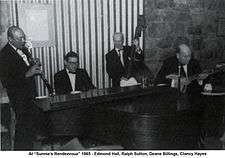
Last concerts
Hall was back home for Christmas. On January 1967 there was another important engagement the "John Hammonds 30th Anniversary Concert - Spirituals to Swing" at the grand Carnegie Hall in New York. Hall was invited as he belonged to a group called the "Cafe Society Band", which was featured at the concert. The next important concert was the "Second Annual Boston Globe Jazz Festival" on January 21, 1967.

February 3. 1967 Hall played at the "Governor Dummer Academy" with George Poor's band, together with Bobby Hackett as the featured stars. The concert was recorded and is available on CD as "Edmond Hall's last Concert". On February, Wednesday 12, 1967 at 11 A.M. Edmond Hall died. He had shoveled snow from the sidewalk in front of his house. Shortly after he got in his car, which later was found by the side of the road, he died of a heart attack. Edmond Hall was 65. He was buried in Mount Auburn Cemetery, Cambridge, Massachusetts.[1] · [2]
.jpg)
Private life
In April 1922, while playing in Buddy Petit's Band, Ed Hall married a 17-year-old girl, Octavia Stewart, in Reserve. Hall was 20 and Octavia 17. The marriage was prompted by the imminent arrival of son Elton Edmond Hall, who was born on July 20, 1922, but died as a child on December 3. 1934.
On May 12, 1938, he married his second wife Winnie. Winnifred Henry came from Cambridge Massachusetts. Hall first met her while playing with the Hopkins Band three years earlier, at the Ruggles Hall in Boston. They had no children.
Hall was constantly practicing his clarinet even on his days off. Winnie sometimes was part of his travels. They had friends in England whom they visited frequently. Throughout his career into the mid-1950s Hall, like so many, was confronted with race discrimination:
In 1951, while playing at Condon's a film crew came in and wanted Hall to play the background track but be replaced with Pee Wee Russell for the actual shooting. Hall refused and called his union. Condon and the other musicians supported him. Losing a large audience in the south, if displaying a black man in the band was the company's reasoning. They did make 2 versions but in the end the version with Hall was the only one released. Hall also recalled being talked to by police frequently, about the way he had parked his car, while others in the group were not bothered. He and his wife were refused a hotel room on a trip up the coast from New York to San Francisco in his Jaguar, forcing the Halls to spend the night in their car.
In 1952, Hall, Buzzy Drootin and Ralph Sutton appeared as the Ralph Sutton Trio in Saint Louis, where they played the "Encore Lounge" for several weeks. They were the first mixed trio there.

Awards
- 1945 Hall wins Esquire Magazine Silver Award for clarinet, second to his most admired clarinetist Benny Goodman
- 1961 Hall received a certificate for nomination as one of the outstanding jazz artists of 1961 from Playboy Magazine
- 1961 Hall was awarded as the best Clarinetist by the "English Melody Maker"
Discography
Edmond Hall Profoundly Blue with Charlie Christian, guitar; Meade Lux Lewis, piano; Red Norvo, vibraphone, Teddy Wilson, piano (Blue Note, CD 7243 8 21260 27)
Commodore classics in Swing - Edmond Hall & Teddy Wilson with Teddy Wilson, piano; Billy Taylor, bass; Arthur Trappier, drums
LABEL: Commodore
Edmond Hall "Flyin' High" with Dick Cary, piano; Jim Raney, guitar; Al Hall. bass(NOT RELATED TO ED); Jimmy Crawford, drums
LABEL: IAJRC CD 1020
Eddie Condon - Jam Session Coast to Coast with Eddie Condon, guitar; Wild Bill Davison and Billy Butterfield, trumpet; Cutty Cutshall and Lou McGarity, trombone; Dick Cary, alto horn; Ed Hall and Peanuts Hucko, clarinet; Bud Freeman, tenor sax; Gene Schroeder, piano; Al Hall (NOT RELATED TO ED), bass; Cliff Leeman, drums
LABEL: Collectables CD 7526
Edmond Hall's Last Concert with Bobby Hackett, George Poor, Trumpet; Ed Hall, Clarinet; Joe Robertson, trombone; Joe Battaglia, piano; Wally Livingston, bass, Dale Pearman, drums
LABEL: Jazzoology CD 223
ED HALL WITH ARMSTRONG:
Louis Armstrong and All Star Dates 1947–50 with Edmond Hall's All Stars 1947
LABEL: Forlane International CD 19002
AMBASSADOR SATCH with Louis Armstrong, trumpet; Trummy Young, trombone; Edmond Hall, clarinet, Billy Kyle, Piano; Arvell Shaw, bass(although this might not be the case if referring to the personnel in the biography and photos); Barrett Deems, drums
LABEL: Columbia
Satchmo The Great with Louis Armstrong, trumpet; Trummy Young, trombone; Edmond Hall, clarinet, Billy Kyle, piano; Arvell Shaw and Dale Jones, bass; Barrett Deems, drums; The Lewisohn Stadium Symphonic Orchestra under Leonard Bernstein
LABEL: Columbia
Louis Armstrong -The Great Chicago Concert 1956 with Louis Armstrong, trumpet; Trummy Young, trombone; Edmond Hall, clarinet, Billy Kyle, piano; Dale Jones, bass; Barrett Deems, drums, Velma Middleton, vocals
LABEL: Columbia
Louis Armstrong - On The Road with Louis Armstrong, trumpet; Trummy Young, trombone; Edmond Hall, clarinet, Billy Kyle, piano; Squire Gersh, bass; Barrett Deems, drums, Velma Middleton, vocals
LABEL: Laserlight Digital
Satchmo - A Musical Autobiography with Louis Armstrong; Yank Lawson, trumpet; Trummy Young and Jack Teagarden, trombone; Edmond Hall, and Barney Bigard, clarinet; George Dorsey, Hilton Jefferson, alto sax; Bud Freeman, Seldon Powell, Lucky Thompson, tenor sax; Dave McRae, baritone-bass sax, bass clarinet; Billy Kyle, Dick Cary, Earl Hines, piano; Everett Barksdale, George Barns, guitar; Arvell Shaw, Squire Gersh, bass; Barrett Deems, Sid Catlett, Cozy Cole, Kenny John, drums; Velma Middleton, vocals
LABEL: Verve
Records under VIC DICKENSON and WILD BILL DAVISON, CHRIS BARBER(rare), CLAUDE HOPKINS, and others contain tracks with Hall on Clarinet as well, many of them available at Amazon mp3 download and or as CD.
References
- ↑ Edmond Hall Dies; Jazz Clarinetist in The Connecticut Post, February 13, 1967.
- ↑ Grave search tool on Mount Auburn Cemetery website.
- Manfred Selchow, "Profoundly Blue" a Bio - Discographical Scrapbook on Edmond Hall 1988
- Dick M. Bakker Billie Holiday and Teddy Wilson 1932–1934, Alphen aan de Rijn, Netherlands 1975
- Alan Barrell, Four Brothers - Halls of Fame, Vol. X - No. 6 1979
- Alan Barrell, About Lee Collins, Vol. V - No. 4, 1974
- Walter Bruyninckx, 60 Years of Recorded Jazz 1917–1977, Mechelen Belgium
- Brian Case/Stan Britt, The illustrated Encyclopedia of Jazz, Salamander books London 1978
- Samuel B Charters, Jazz new Orleans 1885–1963
- John Chilton, Who's Who of Jazz, Chilton Book Company, Philadelphia, New York, London 1970
- John Chilton, Blues, Blues; quartet books, London 1977
- Mary Collins, John W. Miner, Jazz: From Lee Collins' Story, Evergreen review 35, March 1965
- Stanley Dance, The World of Swing, New York 1974
- Stanley Dance, Jazz Era - The Forties, Jazz Book Club, London 1962
- Jempi de Donder, My Buddy, Vol. XIV, No. 3, February/March 1983
- Jorgen Grunnet Jepsen, Jazz Records 1942–1962, Emil Knudsen, Holte Denmark
- Max Jones, The Edmond Hall Story (3 parts), Melody maker, April 1956
- Orrin Keepnews/Bill Grauer jr.,Pictorial History of Jazz, revised edition, Spring Books, The Hamlyn
- Publishing Group Ltd., Feltham Middlesex, England, 1968
- Horst H. Lange, Die Deutsche 78er Discographie der Hot-Dance und Jazz-Musik 1903–1958, 2. erweiterte Auflage, Kolloquium Verlag, Berlin, Germany, 1978
- Peter Kunst, Edmond Hall, Jazz Podium 5/Vl, Germany 1957
- Berry McRae, Edmond Hall, jazz journal Vol. XXIII/No.12, December 1970
- Herman Rosenberg/Eugene Williams, New Orleans Clarinets 2, Edmond Hall, jazz Information No. 2, August 9, 1940
- Interviews with Edmond Hall by William Russell and Richard B. Allen, April 11, 1957, and July 18, 1958; Courtesy R.B. Allen - Curator of William Ransom Hogan Jazz Archive, Tulane University, New Orleans, LA
- Interviews with Kid Thomas Valentine by William Russell and Richard B. Allen, 1957,1962; Courtesy R.B. Allen - Curator of William Ransom Hogan Jazz Archive, Tulane University, New Orleans, LA
- Brian Rust, Jazz Records 1897–1942, 4th edition, Arlington House Publishers, New York 1978
- James D. Shacter, Piano Man, Jaynar Press, Chicago 1975
- Nat Shapiro/Nat Hentoff, Hear Me Talkin' To Ya, Dover Publications, New York 1995
- Charles E. Smith, Ed Hall - Gentleman Traveler, Downbeat, 11, 24, 1960
- Anton Trular, New Orleans Musiker in Europa: Edmond Hall, Jazz Podium No.9/lX - 1960
- C.K. "Bozy" White, The Eddie Condon Town Hall Broadcasts 1944–1955, Shoestring Records, oakland, Ca 1980
- Magazines: Billboard, Cadence, Coda, Down Beat, Esquire, Jazz Journal, Jazz Magazin, Jazz News, Jazz Podium, Manchester Guardian, Melody Maker, Metronome, Music Maker, New Yorker, Quarterly Rag, Storyville, Tempo The Observer, Variety
- Felix Blair, New York Times, 1955
- P. Scott of Globe and mail, 5/5/1962
- Leonard Feather, New Yorker Post 8/2/1964
External links
- BBC Radio 2
- All Music
- Interview with Edmond Hall, undated. University of Texas at San Antonio: Institute of Texan Cultures: Oral History Collection, UA 15.01, University of Texas at San Antonio Libraries Special Collections.